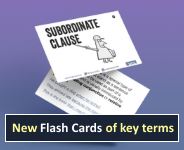Grammatical functions in the clause
The description of word classes, phrases, and clauses in terms of their structure is part of the study of form. We now turn to the study of grammar from the perspective of function: this notion refers to what words, phrases and clauses do as units of language.
Grammatical functions are the roles that different constituents (strings of words acting as units) play in clauses. Examples are Subject and Object (also called Direct Object).
NOTE: We use initial capitals for functional terms like Subject and Object, to make it easier to distinguish them from formal terms like noun, noun phrase, verb, etc.
Understanding how clauses are formed and how constituents work together is important in developing both close reading and effective writing skills.
Compare the following examples. How do they differ in meaning?
- The police attacked the demonstrators.
- The demonstrators attacked the police.
In the first example, the police are the ones doing the attacking, whereas in the second the police are the ones being attacked.
Grammatically what's happening here is that the same noun phrase, the police, occurs with a different grammatical function in each example:
- The police attacked the demonstrators. [Subject]
- The demonstrators attacked the police. [Object]
In the first example, the noun phrase the police is positioned before the verb and functions as Subject. In the second, it is positioned after the verb and functions as Object.
The form is the same (the police is a noun phrase in both cases), but the function is different.
The examples we looked at describe an action of attacking, involving two participants: the agent carrying out the attack and the patient (or 'undergoer') affected by the attack.
But what about this example? Is there an action with an agent and patient?
-
The students know the answer.
This example involves ‘knowing’ – which is not an action but a state of affairs. The students are not agents ‘acting on’ the answer.
But this clause has the same kind of grammatical pattern as the ‘attacking’ examples. It has a Subject (the students) before the verb and an Object (the answer) after it.
This means we can’t define grammatical functions purely in terms of meanings such as agent and patient.
Instead we need to look at the grammatical behaviour of phrases, for example:
- What is their position in the clause?
- How do they relate to other elements?
The most central element in the clause is the verb. It has the function of Predicator:
- The police attacked the demonstrators.
The main verb generally tells us what kind of ‘situation’ is involved – for example, an action like ‘attacking’ or ‘eating’, or a state like ‘knowing’ or ‘believing’.
The Predicator can combine with various other functional elements to make different clause patterns.
One simple clause pattern consists of a noun phrase functioning as Subject, followed by a verb functioning as Predicator.
Examples are:
- She laughed. [W2F-018 #189]
- The scrum collapses. [S2A-002 #180]
- The head of the company died. [S1A-018 #130]
Here the Predicator indicates the type of situation (laughing, collapsing, dying) and the Subject tells us who or what is involved in the situation (who or what is laughing, and so on).
We can show the structure of these examples as follows. The first line of the table shows the form labels and the second line shows the function labels.
|
form |
noun phrase |
verb |
|
function |
Subject |
Predicator |
|
example 1 |
She |
laughed |
|
example 2 |
The scrum |
collapses |
|
example 3 |
The head of the company |
died |
This simple pattern is often extended by one or more phrases which specify a circumstance of the situation – such as when, where or how it happens. These phrases function as Adverbials:
- It rolled beautifully. [S1A-057 #316]
- Once upon a time I walked into a law school. [S2A-044 #20]
- The icecap soon reforms. [W2B-025 #66]
Adverbials are typically preposition phrases or adverb phrases. They can be found in various positions in the clause.
Welcome!

Englicious is totally free for everyone to use!
But in exchange, we ask that you register for an account on our site.
If you’ve already registered, you can log in straight away.
Since this is your first visit today, you can see this page by clicking the button below.

